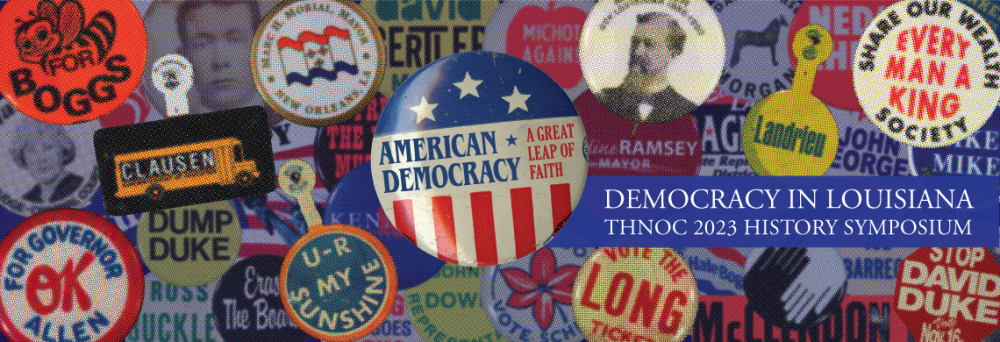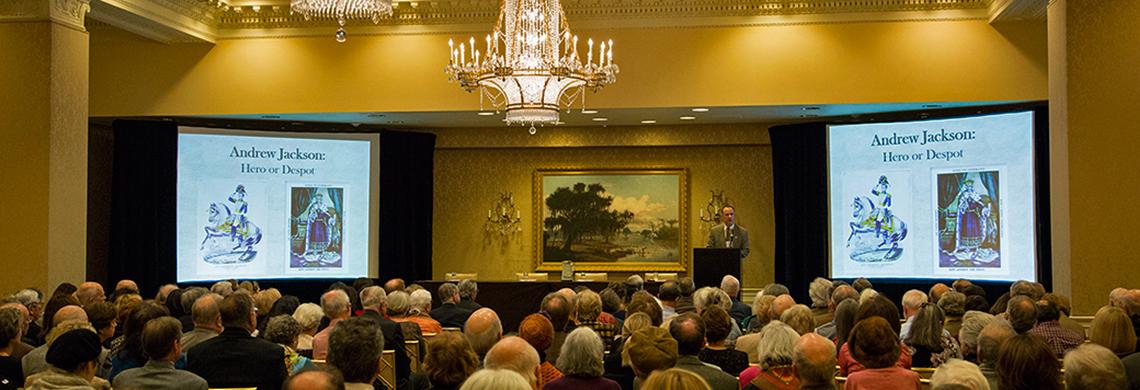Democracy in Louisiana
In-person presentations April 1, 2023
Hotel Monteleone, 214 Royal Street in the French Quarter
9 a.m.–5 p.m.
General admission, $75; Students, teachers, and active military with a valid ID, $20
In anticipation of American Democracy: A Great Leap of Faith, a traveling exhibition from the Smithsonian Institution coming to THNOC in mid-June, the 2023 History Symposium explores how the democratic system has functioned in Louisiana and how key events have influenced our current political climate.
The one-day, in-person event, scheduled for April 1, 2023, will feature moderator Dr. Pearson Cross and a vibrant slate of speakers addressing topics ranging from the drafting of the first constitution and the politics of enslavement to the women’s suffrage movement in New Orleans and how Louisiana’s environment impacts public policy. The symposium also complements “Yet She Is Advancing”: New Orleans Women and the Right to Vote, 1878–1970, a THNOC exhibition opening in late April.
Registration for the 2023 History Symposium opens February 27 for THNOC members and March 6 for the general public.
Schedule of Events
8–9 a.m.
Registration
9–9:10 a.m.
Welcome
Daniel Hammer, President and CEO, The Historic New Orleans Collection
9:10–9:20 a.m.
Introduction
Dr. Pearson Cross, moderator, Professor and Director, School of Behavioral and Social Sciences, University of Louisiana at Monroe, and co-editor of The Party Is Over: The New Louisiana Politics (LSU, 2022)
9:20–10 a.m.
Keynote Address
The Promise of Democracy: Federal Tribal Acknowledgment Policy in Louisiana
Dr. Brian Klopotek, Associate Professor of Indigenous, Race, and Ethnic Studies, University of Oregon
10 a.m.–10:15 a.m.
Coffee Break
For all of the late-morning and afternoon sessions, Dr. Cross will offer constructed responses, tying the historical topics to today’s political landscape.
10:15–11 a.m.
Governance through Amendment: The Evolution of the State Constitution
Dr. Steven Procopio, President, Public Affairs Research Council of Louisiana
11–11:45 a.m.
The Centrality of Enslavement in Early Statehood
Dr. Laura Rosanne Adderley, Associate Professor of History, Tulane University
11:45 a.m.–1:15 p.m.
Lunch (on your own)
1:15–2 p.m.
Reconstruction through Civil Rights: Racial Memory and Identity in Louisiana
Dr. Theodore R. Foster III, Assistant Professor of African American History and Studies, Benedictine University
2–2:45 p.m.
New Orleans Women and the Right to Vote: 1878–1970
Dr. Libby Neidenbach, Interpretive Training Coordinator, The Historic New Orleans Collection
2:45–3 p.m.
Coffee Break
3–3:45 p.m.
From Populism to Partisanship
Dr. Albert L. Samuels, Jewel L. Prestage-Kellogg Professor of Political Science and the Chair of the Department of Political Science and College, Southern University and A&M College
3:45–4:15 p.m.
The Bottom Line: The Significance of Data in Our Democracy
Rebecca Mowbray, President, CEO, and Samuel Zemurray Chair in Research Leadership, Bureau of Governmental Research, in conversation with Lamar Gardere, Executive Director, the Data Center
4:15–5:00 p.m.
Democracy and the Environment Before and After Katrina
Dr. Andy Horowitz, Connecticut State Historian, Associate Professor of History, University of Connecticut
5:00–5:15 p.m.
Questions and Answers
Dr. Pearson Cross
5:15–5:30 p.m.
Closing Remarks
Dr. Pearson Cross and Daniel Hammer
5:30–7:30 p.m.
Champagne Reception


